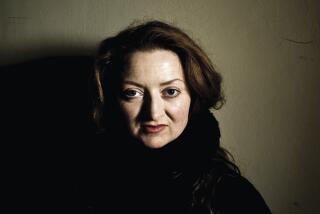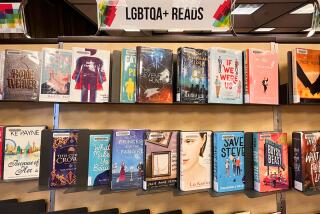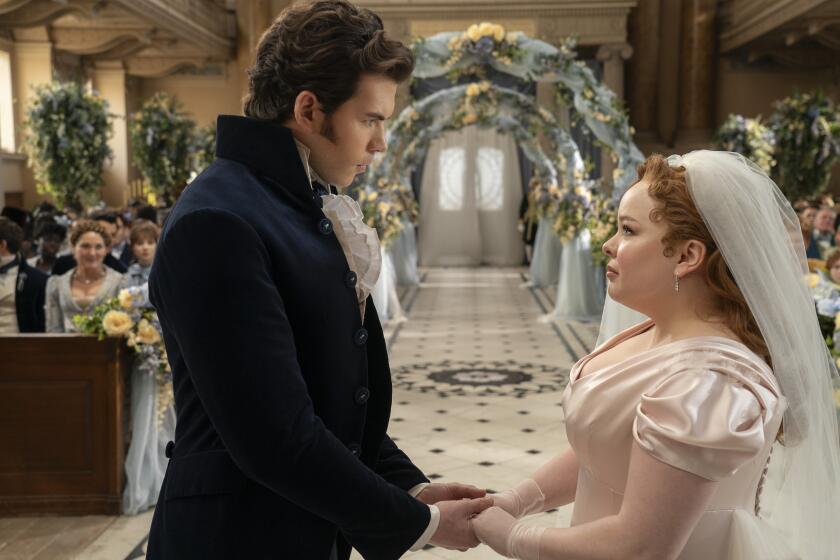From tragic fact, realistic fiction
Denise Nicholas can trace the end of her childhood to the summer of 1964. The brash Summer of Love would follow only three years later, but Freedom Summer was about something simpler and far more dangerous -- asserting black people’s right to vote in small-town Mississippi.
“Mississippi has always been symbolic of the worst kind of racism in America, the worst coming out of slavery, the worst coming out after Reconstruction, the lynchings, the killings,” says actress-author Nicholas, 61. “Nina Simone had a song, ‘Mississippi Goddam!’ That’s real, and has resonance with most black people of a certain age.”
For her first novel, “Freshwater Road,” Nicholas went back to her days as a novice actor before she found fame as a high school guidance counselor on the early ‘70s series “Room 222” and as a councilwoman on TV’s “In the Heat of the Night” two decades later. A chance meeting with the charismatic theater director Gil Moses persuaded her to join his Free Southern Theater as it toured small Southern towns at the height of the civil rights movement.
The day she arrived in Mississippi was the day that three young civil rights activists, Michael Schwerner, James Chaney and Andrew Goodman, were killed -- June 21, 1964.
The experience carried risks Nicholas hadn’t bargained for. One day, she had the barrel of a gun jabbed at her temple by a New Orleans police officer as she stepped out of her French Quarter apartment. She was looking for visiting photojournalists who hadn’t returned from a trip across the street to buy cigarettes. The photographers lay prostrate on the ground while the police ripped out their film documenting the strife they had seen while in Mississippi. She was 20 years old.
“I recall saying, ‘What’s going on?’ And that’s when the cop put a gun to my head and said, ‘Take one more step and I’ll blow your brains out,’ ” Nicholas recalls. “I was just a kid.”
And then suddenly, she wasn’t. In the novel, 19-year-old Celeste Tyree faces her own sometimes terrifying coming-of-age as a privileged University of Michigan student who heads south to take part in the voter-registration campaign. When she joins a small band of black people asserting their constitutional right to register to vote in fictional Pineyville, the town sheriff holds a gun to her temple.
“What I use in the story is exactly that moment of gun to head -- officials of the law putting a gun to somebody’s head for doing something that is quite ordinary,” she says.
Nicholas is sitting in a leather wing chair in the den of her light-filled home just south of Hancock Park. A ceiling fan whirs lazily overhead, stirring the sultry summer air. As she speaks, she alternates quickly between bouts of laughter and gravitas.
She is attracting notice for her foray into an under-populated literary genre -- novels about the civil rights movement. Entertainment Weekly called “Freshwater Road” “a hypnotic novel.” On the jacket are paeans from longtime friend Sidney Poitier and her writing teacher, “White Oleander” author Janet Fitch, who trumpets her ability to “bring alive all the colors and emotions of the civil rights movement.”
The book portrays the unrelenting tension of that summer: keeping an eye out for the Klan when out at night, having shots fired through the window pane.
Nicholas spent two years traveling around Mississippi and Louisiana performing plays by Bertolt Brecht, Ossie Davis and Samuel Beckett in the churches of tiny, backwater towns. After each performance, the company would invite the audience to discuss what they’d seen.
“This was something that was quite new in many of the towns we went to,” Nicholas says. “A lot of what was going on in the world was not there. It was like we were behind a kind of iron curtain in Mississippi. Things had not changed much since the 1800s.”
Yet audiences embraced Beckett’s difficult “Waiting for Godot” and its resonant images of one person enslaving another. The evening the company performed the play in Ruleville, Miss., Fannie Lou Hamer, who became a potent spiritual force in the civil rights movement, led the discussion.
“She stood up in the church and said, ‘Well, we know something about waiting, don’t we?’ And everyone went, ‘Whoa, yeah. Amen.’ ”
Nicholas’ acting career took her to New York and later California, but her two years in the South left their mark. “It taught me just about everything I needed to know about racism in America,” she says. “The parallels or the offshoots of that experience I see every day, everywhere I go in this country.”
For years, Nicholas fit writing in the interstices of her acting career. She tried her hand at writing television scripts, which were produced for “In the Heat of the Night.” As a master of professional writing student at USC in the late ‘90s, she wrote a play about Rosa Parks called “Buses.”
She had toyed with writing a civil rights novel since the ‘70s, but it wasn’t until five years ago that she began the book in earnest. She had applied to join Fitch’s writing class in Silver Lake and submitted her tentative beginning, which included a scene centering on Celeste’s father, Shuck.
“She brought in a scene set in a bar with Shuck and six other characters, and she was able to have clean dialogue where everyone had a point of view,” Fitch says. “It’s a very difficult thing to do. That caught my attention.”
Fitch took her in hand, and Nicholas says,”From that point until the day the hardback arrived, I have not done anything but that book.”
It may seem counterintuitive, but Nicholas began by burning the journals she’d kept during her years in the South. “I wanted to use my experience only as a jumping-off point,” she says.
She studied the period voraciously and traveled to the Piney Woods of southern Mississippi to help her visualize the fictional town of “Freshwater Road.” She came back with soil samples and pine cones which she placed in her study so she could contemplate them while she was writing.
The thrice-divorced Nicholas has begun work on her next book, an investigative memoir about the unsolved murder of her younger sister, Michele Burgen, formerly an editor at Ebony magazine.
While it may seem unthinkable now that an entire region would consider it business as usual to take out a stranger on the street because of the color of his skin, Nicholas cautions against complacency. After all, it took just as long for Edgar Ray Killen to be brought to justice for killing Schwerner, Chaney and Goodman as it did for her to bring “Freshwater Road” to life.
“There is a great deal of difference between then and now and some things have changed and thank God they have,” she says. “But there’s such a conservative bent in the country now that some of that progress is being rolled back. If you’re not forever watchful, you end up ... back where you started.... There is no rest from being black in America.”
*
‘Freshwater Road’ readings
Where: Dutton’s Beverly Hills Books, 447 N. Canon Drive, Beverly Hills.
When: 7 p.m., Tuesday.
Contact: (310) 281-0997.
Also
Where: Barnes & Noble Booksellers, the Grove at Farmers Market, 189 Grove Drive, Suite K30, Los Angeles.
When: 7:30 p.m., Oct. 19.
Contact: (323) 525-0270.
More to Read
Sign up for our Book Club newsletter
Get the latest news, events and more from the Los Angeles Times Book Club, and help us get L.A. reading and talking.
You may occasionally receive promotional content from the Los Angeles Times.






